 Petzlover
Petzlover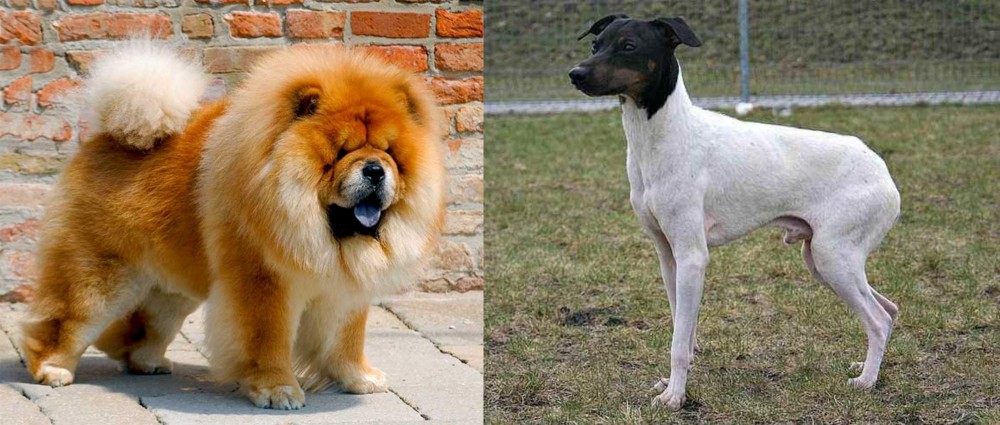 Chow Chow is originated from China but Japanese Terrier is originated from Japan. Chow Chow may grow 18 cm / 8 inches higher than Japanese Terrier. Chow Chow may weigh 27 kg / 60 pounds more than Japanese Terrier. Both Chow Chow and Japanese Terrier has almost same life span. Both Chow Chow and Japanese Terrier has almost same litter size. Chow Chow requires High Maintenance. But Japanese Terrier requires Low Maintenance
Chow Chow is originated from China but Japanese Terrier is originated from Japan. Chow Chow may grow 18 cm / 8 inches higher than Japanese Terrier. Chow Chow may weigh 27 kg / 60 pounds more than Japanese Terrier. Both Chow Chow and Japanese Terrier has almost same life span. Both Chow Chow and Japanese Terrier has almost same litter size. Chow Chow requires High Maintenance. But Japanese Terrier requires Low Maintenance
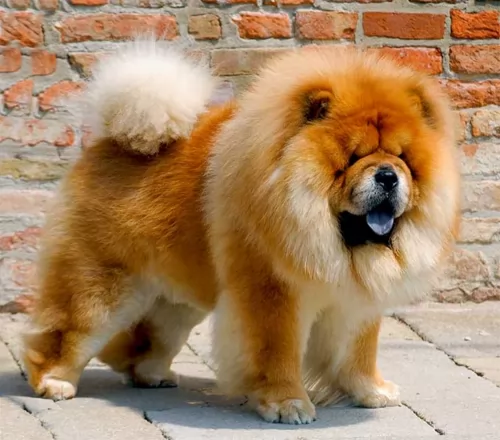 Northern China is the original home of the Chow Chow. In that region of China, the breed was known as the Songshi Quan – “the puffy-lion” dog. They have also been known in China as the “Dog of the Tang Empire” or the Tang Quan. The Chow is believed to be an ancient breed that the Foo Dog, or stone dog guardians of Buddhist palaces and temples, is modeled after. It is one of the most ancient of dog breeds that are still around today.
Northern China is the original home of the Chow Chow. In that region of China, the breed was known as the Songshi Quan – “the puffy-lion” dog. They have also been known in China as the “Dog of the Tang Empire” or the Tang Quan. The Chow is believed to be an ancient breed that the Foo Dog, or stone dog guardians of Buddhist palaces and temples, is modeled after. It is one of the most ancient of dog breeds that are still around today.
It is believed that they have existed for around 2000 years or perhaps even as far back as 3000 years, starting out in Mongolia and migrating to China. The ancientness of the Chow Chow has been validated through DNA testing. In China all those centuries ago, the Chow Chow was born to be a working dog. They hunted, herded, guarded and pulled carts. They went on quests with the Mongolian armies when China was invaded, as well as when the Mongolians invaded the Middle East and Europe later on.
Today’s Canadian Kennel Club has about 350 Chows registered while the AKC gets 10,000 new registrations every year.
 The Japanese Terrier is native to Japan and is a rare pure bred dog. It is believed that the dog comes from Smooth Fox Terriers who arrived way back in the 17th century.
The Japanese Terrier is native to Japan and is a rare pure bred dog. It is believed that the dog comes from Smooth Fox Terriers who arrived way back in the 17th century.
Certainly he looks very much like a regular Fox Terrier. It is thought that these smooth Fox Terriers were then interbred with local, Japanese dogs and used to hunt rats. Gradually he became a lap dog and companion.
Planned breeding of the dog began in 1920, and it was in 1930 that the dog was admitted to the Japanese Kennel Club with a breeding program being started.
Today you will find the Japanese Terrier in his home country and small numbers elsewhere. He was admitted to the United Kennel Club in 2006.
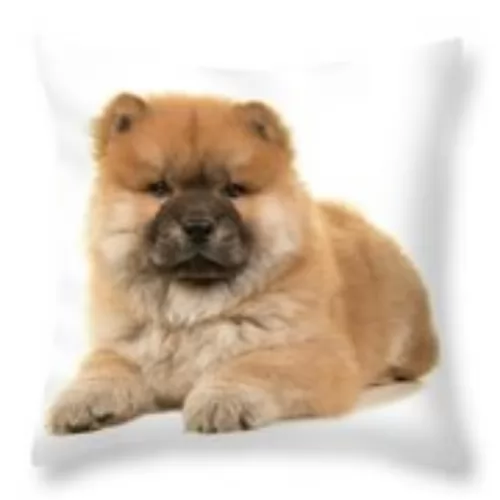 The Chow really does look like a small lion with a black tongue. The dog is sturdy and square with erect, small ears on a broad skull. They have a very dense double coat. Their eyes are deep set and look like almonds, while they all have that very distinctive purple or black tongue. Their lips are also distinctive with their blue color. The nose is black, but some Chows might have a blue nose. The tail is curly.
The Chow really does look like a small lion with a black tongue. The dog is sturdy and square with erect, small ears on a broad skull. They have a very dense double coat. Their eyes are deep set and look like almonds, while they all have that very distinctive purple or black tongue. Their lips are also distinctive with their blue color. The nose is black, but some Chows might have a blue nose. The tail is curly.
These are medium size dogs when it comes to height and weight, but they are powerfully built for their size. Their power is in their compact body holding the energy and strength of a much larger dog. Its hind legs are almost entirely straight, unusual for any dog. They get their lion appearance from the huge ruff that stands behind their heads. Their chest is broad and deep.
 The Japanese Terrier is a small sized dog who stands at 20 – 33cm at the shoulders and weighs in at about 2 to 5kg.
The Japanese Terrier is a small sized dog who stands at 20 – 33cm at the shoulders and weighs in at about 2 to 5kg.
He is a short, smooth haired dog with a tight skin and in colors of white and black. Sometimes you may find a little bit of tan color on the face too as well as 'freckles' around the neck area and legs. The black shading of the coat is essentially found around the head of the dog and also his ears.
His ears are set high on the head and are semi-erect, semi-floppy. The tail has always been traditionally docked, giving the dog a nice compact look but these days it is unfortunately often left long and then its a medium length tail which is thinly covered in short hair. The nose is black and the eye are brown, bright and alert.
Gentle, cheerful, intelligent, loving and loyal are some of the characteristics of the Japanese Terrier. People who have kept him as a pet will vouch for him being a wonderful companion.
He is an active dog, but he still loves to be petted and won’t do well if left alone and not part of his human family. Being a clever dog, he is easy to train, learning easily and quickly. He is quite amusing at times and you can even teach him some tricks.
He gets on well with other pets in the home as well as with children. He is alert and will make a good watchdog, alerting you to an intruder.
Because of the Japanese Terrier’s small size and sensitive nature, this breed needs a calm owner and a quiet household. It is not recommended for boisterous households.
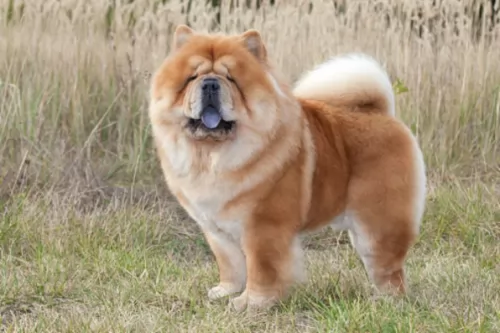 Loyal and true to their family and those they know; the Chow Chow is a little standoffish with strangers. They are very protective and usually attach themselves to one or two people. They are intelligent but stubborn, which can affect your training with them. They need to respect their people and Chows respect hose who take care of them. They can be aggressive toward dogs of their same sex especially if those dogs are the same breed as well.
Loyal and true to their family and those they know; the Chow Chow is a little standoffish with strangers. They are very protective and usually attach themselves to one or two people. They are intelligent but stubborn, which can affect your training with them. They need to respect their people and Chows respect hose who take care of them. They can be aggressive toward dogs of their same sex especially if those dogs are the same breed as well.
They are known to be very clean and many have compared them to cats in that regard. They appear to be dignified and refined. They are usually very quiet but very adaptable dogs.
 As a pet of yours, the Japanese Terrier is an animated, contented little dog. He loves playing games and gets on well with children who aren't rough and disrespectful of him.
As a pet of yours, the Japanese Terrier is an animated, contented little dog. He loves playing games and gets on well with children who aren't rough and disrespectful of him.
He is smart and gentle and loves nothing more than to sit on your lap in the evenings and be your reading- or watching-TV companion. Give him the right amount of attention as any other family member receives and he is guaranteed to make you an excellent, low maintenance pet.
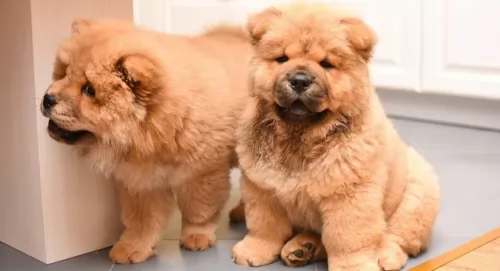 Although an ancient breed that obviously has survived many centuries of trials, the Cho Chow of today is prone to several different health conditions. These include:
Although an ancient breed that obviously has survived many centuries of trials, the Cho Chow of today is prone to several different health conditions. These include:
This condition can require surgery to keep the turning eyelid from injuring the eye ball.
This can cause lameness and arthritis.
This can cause lameness and arthritis.
Make sure you keep the ears clean and keep an eye on them.
 The Japanese Terrier has no particular health issues and has a lifespan of 12 – 15 years if looked after well.
The Japanese Terrier has no particular health issues and has a lifespan of 12 – 15 years if looked after well.
There are always one or two illnesses to watch out for such as eye- and ear infections. Some dogs also develop conditions such as Patella Luxation. This happens when your dog's kneecap is dislocated. It can only be returned to its normal position when certain muscles in the back legs are relaxed and lengthened.
With this condition, your dog holds up one of his hind legs. This condition is more prevalent in small dog breeds.
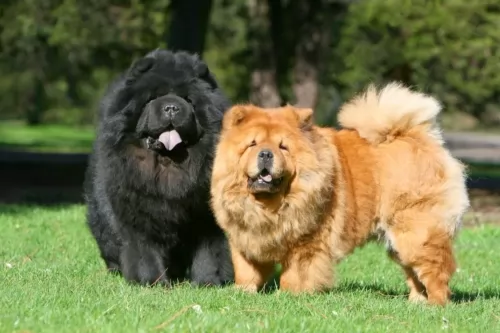 Don’t overfeed a Chow Chow as they are hard workers and big eaters. Feed them at least twice a day.
Don’t overfeed a Chow Chow as they are hard workers and big eaters. Feed them at least twice a day.
This eye disease can lead to blindness if not checked and treated.
These can be removed from an adolescent puppy.
Again, the Chow is susceptible to cancer.
Can lead to heart or kidney problems if left untreated.
Keep a close eye on your Chow Chow skin.
The Chow Chow was developed as working dog, but today’s version is more laid back and doesn’t need excessive exercise. Daily walks will suffice. They live very happily in the city if walked regularly. They are not really a competitive breed outside of obedience and confirmation. They are seldom seen in sports like agility or frisbee.
 The Japanese Terrier is an active dog and will require exercise every day. He’ll love to join you on your walks or have ball games in your garden. He can adapt to life in the city or in the country but will always need to have good exercise.
The Japanese Terrier is an active dog and will require exercise every day. He’ll love to join you on your walks or have ball games in your garden. He can adapt to life in the city or in the country but will always need to have good exercise.
The Japanese Terrier is a medium shedder and you want to be sure then to brush him twice a week to get rid of all those loose hairs.
The Japanese Terriers will require the best commercially manufactured dog food, and instead of one large meal a day, rather feed him 2 smaller meals. You can mix some tasty home-made food into his dry kibble from time to time. Excellent home-made food would be something like cooked chicken, brown rice or pasta and some vegetables.
If you can, try to also include some raw meat occasionally. If you’re in any doubt as to how to feed your Japanese Terrier so that he remains healthy, speak to your veterinarian.
Your dog should never ever be without a continuous supply of fresh, cool drinking water.